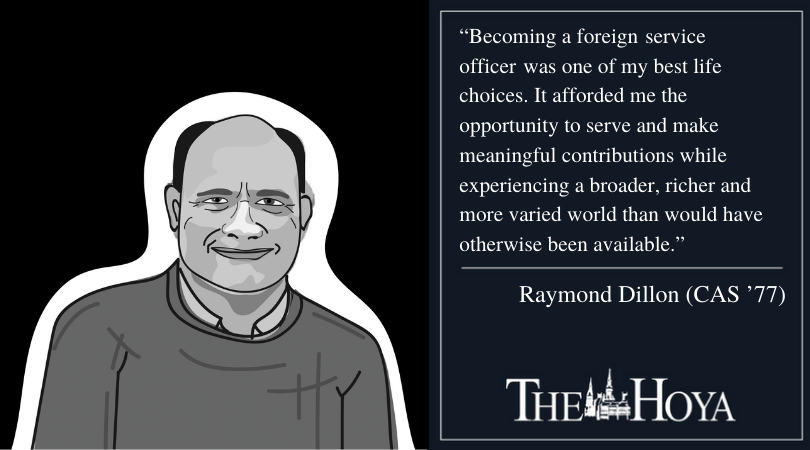As a former foreign service officer, I have followed — with a growing sense of pride — media reports of congressional testimony by U.S. Department of State officials regarding the Ukraine imbroglio. I am not surprised that it is FSOs who are providing the most cogent –— and honest — perspectives. For instance, the prepared statement of Ambassador William Taylor Jr., the U.S. Charge in Kyiv, masterfully lays out the chronology of events that may support the impeachment and removal from office of President Donald Trump. The choice to follow constitutional norms in the face of obstruction throws into sharp relief the cowardice of those who give into the bullying by lesser individuals. This display of patriotism, intelligence, integrity and courage by FSOs demonstrates the best of the United States.
Notwithstanding the powerful message conveyed by the hearings that FSOs can and do make a significant difference, I find myself in the peculiar position of encouraging Georgetown University students to apply for positions in the U.S. diplomatic corps. This call might seem unnecessary with an entire school of the university devoted to the disciplines of international relations. It would be reasonable to presume that at least those matriculating in the School of Foreign Service would consider a career in diplomacy.
The foreign service, though, is under siege, and this nation is at risk of losing what has been termed the United States’ “first line of defense.” Recruitment and retention rates of foreign service members are alarmingly low, according to the American Foreign Service Association, the professional organization of U.S. diplomats. The fundamental reason for the dire state of American diplomacy should be clear to any casual follower of current events — the Trump administration denigrates and attacks FSOs. The latter’s subject matter expertise and strict adherence to nonpartisanship have led to accusations by ideologues of “disloyalty” and being part of a “deep state.” Former colleagues of mine have been subjected to harassment and abuse, with some leaving because the poisonous atmosphere has become intolerable.
The people best equipped to protect America and advance our national interests are cut out of important decisions and “blindsided” by political players undercutting U.S. interests. The chaos and suffering in Syria — triggered by the president’s precipitous abandonment of our Kurdish allies — are directly attributable to the administration’s hollowing out of the State Department. The threat Russian irredentism poses to Ukraine is exacerbated by the machinations of former Mayor Rudy Giuliani who, at the behest of the president, places partisan political considerations before this country’s security.
Therefore, it is not surprising that many people eschew joining the foreign service. However, this juncture is precisely the point at which Georgetown students should step forward to serve their country. Those FSOs fighting for American values today need dedicated individuals to succeed them tomorrow.
Becoming an FSO was one of my best life choices. It afforded me the opportunity to serve and make meaningful contributions while experiencing a broader, richer and more varied world than would have otherwise been available. I lived in places that most tourists only see as a blur and observed the United States through the prism of many other cultures. I saw history unfold, from when I was in the middle of a civil war in Central America to watching the reintegration of Eastern Europe into the family of nations after the disintegration of the Soviet bloc. I witnessed these events and others directly, not through the sterile lens of television.
The popular image of diplomats sipping champagne at receptions is a Hollywood myth. FSOs are not drawn by these imaginary trappings. Nor is it the headline-grabbing events that FSOs find fulfilling; it is the unheralded day-to-day activities that bring satisfaction.
Political officers enlighten American policymakers and alert our military and intelligence communities to potential threats. Economic, commercial and agricultural officers advance U.S. business interests, promoting prosperity and jobs for Americans. Consular officers support Americans traveling and living abroad, often offering comfort to people in distress or peril. Public affairs officers transmit the “message of America,” countering the false narratives of our adversaries. Management officers are the “glue” holding diplomatic missions together.
There is also fun in foreign service. I hiked alpine trails in New Zealand, climbed Mayan ruins in Guatemala, snorkeled on a coral reef in Western Samoa, stood on Hadrian’s Wall in Scotland and wandered through rusting sections of the old Iron Curtain in Slovakia.
The news may seem bleak, but disillusionment should not prevent people from stepping up. The risks are more than outweighed by the rewards. The foreign service is more than a career; it is a calling that Georgetown students should heed.
Raymond Dillon graduated from the College of Arts and Sciences in 1977. A Hoya Looks Back runs online every other Thursday.














